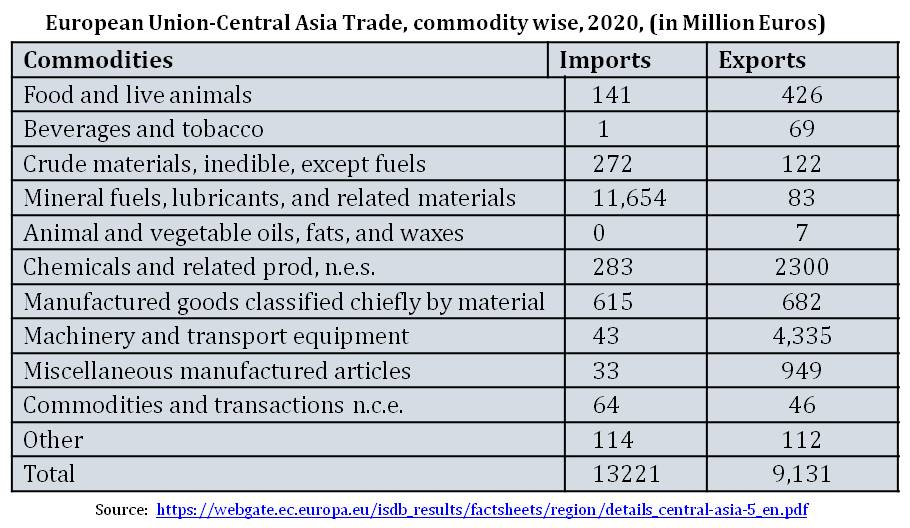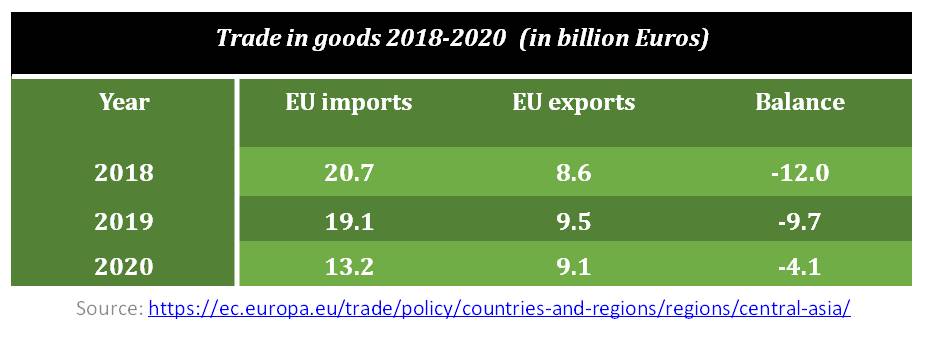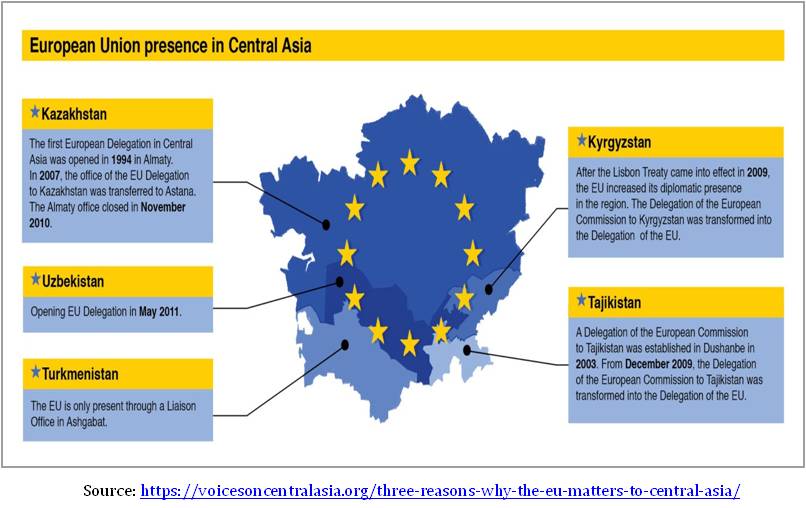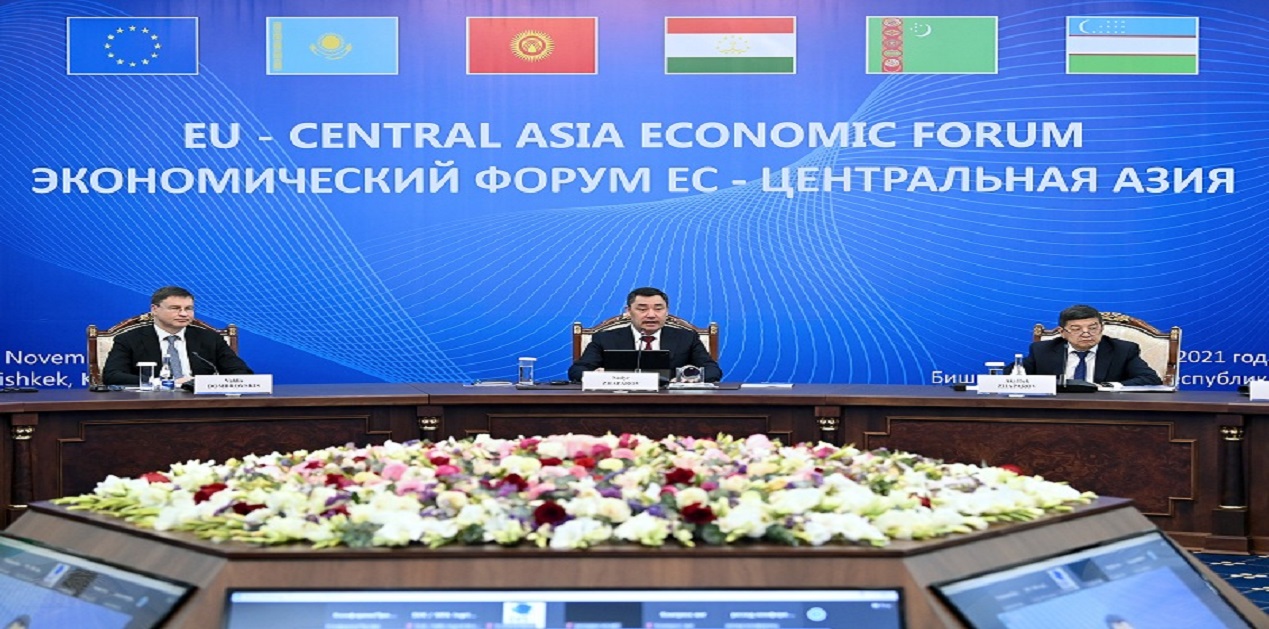On November 5, European Union (EU) leaders met with prime minister-level Central Asian representatives in Bishkek for the inaugural EU-Central Asia Economic Forum. The delegation from the EU was led by Executive Vice-President and Trade Commissioner of European Commission, Valdis Dombrovskis. A broad discussion covered three areas of cooperation highlighted by the Forum: green recovery, digitization, and strengthening the business climate. Subsequently, the participating EU leaders vowed to sustain the flow of investments and aid in accordance with current programmes. They also did not push Central Asian countries to implement concrete or radical reforms in the proposed areas. Alternatively, the Central Asian delegations expressed a desire for a more aggressive EU strategy. [1]
Central Asia's geostrategic location is vital to the EU's interests. The region serves as a link between China, Afghanistan, and the Middle East. The EU imports a substantial amount of energy from the region. Three Central Asian countries (Kyrgyzstan, Tajikistan, and Uzbekistan) benefit from favourable access to the EU's market through the Generalised Scheme of Preferences (Kazakhstan and Turkmenistan, as upper-middle-income level economies, can no longer benefit from this scheme). Kyrgyzstan also benefits from the GSP+ scheme, which grants additional preferences.
EU's engagement with Central Asia has significantly expanded since the early 1990s. In 2007, the EU adopted its first Strategy in Central Asia that established a regular political dialogue and enhanced cooperation in key initiatives, including the rule of law, education, and environment. In 2017, the EU and its Member States reaffirmed their commitment to developing a strong and durable relationship with Central Asia. Joint Communiqué on "The EU and Central Asia: New Opportunities for a Stronger Partnership" was adopted by the European Commission and the High Representative in 2019.[2] The first EU-Central Asia Economic Forum is a result of this policy.
The European Union is a key donor and development partner in Central Asia. The European Commission's aid to Central Asia totaled 1.1 billion Euros from 2014 to 2020. As part of the 'Team Europe' response to the COVID-19 outbreak, the EU mobilised 134 million Euros for Central Asia to fight against the coronavirus. Moreover, the EU announced a 3 million Euros through its 'Central Asia COVID-19 Crisis Response Solidarity Programme' in July 2020, with a major focus on Kazakhstan and Turkmenistan. [3]
When we analyse the European interest in Central Asia, three elements have competed for attention:
1) The promotion of human rights, the rule of law, and the civil society, which is essential to EU values as a basis for active participation;
2) Energy interests aimed at connecting Turkmenistan to the Southern Corridor; and
3) promotion of security in ‘Greater Central Asia’, first through NATO's military engagement in Afghanistan from 2001 to 2014, and since then by continuing to equip and train Afghan forces.
These goals have occasionally clashed, and the EU frequently lacks the resources to address internal conflicts. The economic and fiscal crisis in several EU countries and the ongoing refugee crisis diverted attention from non-priority areas such as Central Asia. EU policy has remained torn between these approaches, clearly prioritizing energy and security over a values agenda. [4]
Trade
The EU's trade with Central Asia has gradually increased, and the EU is now the region's one of the most important commercial partners. EU accounts for around a third of Central Asia's total external trade. Despite this, the EU's overall commercial turnover with Central Asia remains modest. Exports from Central Asia to the EU are still dominated by a few commodities, namely crude oil, gas, metals, and cotton fiber. Machinery and transport equipment and other manufactured commodities account for the majority of EU exports. More than half of EU exports to the region remain of this kind.

The energy sector drives EU-Central Asia trade. Oil products account for almost 80% of Kazakhstan's exports to the EU. The energy exports from Central Asia to Europe run through Caspian Sea pipelines. After hydrocarbons, the cooperation in the nuclear industry accounts for a significant share of Europe's engagement in Central Asia. Whether it is uranium extraction in Kazakhstan and Uzbekistan or nuclear power plant building, the EU has great potential to collaborate in this sector.[5] The extraction of valuable minerals and metallurgy and the Central Asian energy industry, where European enterprises have established themselves despite the fierce worldwide competition, can be added to the list of drivers of EU's Central Asia policy. [6]

Security
Three Central Asian countries, Uzbekistan, Tajikistan, and Turkmenistan share a direct border with Afghanistan, which has been politically unstable since the 1990s. In terms of Afghanistan and the security concerns that it entails, the EU provides aid to the Central Asian partners in border security management and the combat against drug trafficking. Since 2013, high-level political and security dialogues between the EU and Central Asia have been held regularly. With the opening of the EU Delegation in Turkmenistan in July 2019, there are now EU Delegations in all Central Asian nations.

On July 1, 2021, Tashkent hosted the seventh High-Level Political and Security Dialogue between the European Union and Central Asian nations, where Afghanistan also participated. The meeting provided an opportunity to explore regional dynamics and improve regional cooperation on a wide range of problems, including border management, security, and the development of long-term connectivity.
With the Taliban takeover of Afghanistan in August 2021, the EU-Central Asia cooperation in this area has become crucial. Central Asian Republics helped European countries to evacuate their citizens from Afghanistan. Except for Tajikistan, all Central Asian nations have been diplomatically involved with the Taliban government and provided humanitarian assistance. This has made Central Asia more relevant to Europe than ever. And there is also a convergence of interests between the EU and Central Asia concerning Afghanistan as these republics require financial aid provided by the European Union.
First EU-Central Asia Economic Forum
The most promising subject of the Forum was the transition to green recovery. On the topic of energy investment, a detailed discussion was held amongst the representatives from both sides. [7] The Forum appreciated Central Asian states' commitments to cut emissions as part of their nationally determined contribution to zero-emission concerning the transition to green recovery. The Forum recognised Central Asia's potential to generate clean, climate-neutral renewable energy and the need to develop and implement policies that ensure a net-zero-emissions economy, attract investments in renewable energy sources, and encourage emission-reducing innovations and facilitate intra-regional trade in sustainably generated electricity. In this regard, the EU has been providing aid to the Central Asian nations through several initiatives, including the EU-funded Central Asia Water and Energy Programme and the Enhanced Regional Co-operation on Environment, Water Programme, and Climate Change. Now that Central Asian countries face a serious environmental crisis, the EU can be a serious contributor to assisting these countries to curb these challenges by providing financial aid and technical support.
On the issue of digitisation, the Forum applauded the Central Asian governments' efforts to adopt national digital policies. It acknowledged the development of recent reforms, notably in e-governance, before and during the COVID-19 period. The EU has also been assisting Central Asian nations with their digitalization efforts. As a constructive outcome of the Forum, Central Asia will soon be the staging point for the EU's Digital Education Action Plan for 2021–27.[8]
An improvement in the business climate in Central Asia is another concern for the EU's engagement with this region. A broad discussion on this subject took place at this Forum, where each Central Asian country seemed committed to improving the business climate in their respective countries. Even Turkmenistan, which has a planned economy, has agreed to make some modifications in the management of its state-owned enterprises. All Central Asian delegations, except Kazakhstan, described the recent business-oriented changes with the hopes of attracting foreign investment. EU leaders did not use this platform to push CARs to make fundamental reforms; instead, they promised to continue providing economic aid and technical assistance through existing programmes.[9]
Since 2017, Uzbek President Shawkat Mirziyoyev has created a transformed business environment in Uzbekistan. He also brought all the Central Asian leaders on a single platform to discuss the regional issues, which further paved the way for an improved business climate in Central Asia. The Forum agreed that a strong business climate is necessary for getting higher employment and diversifying production and mutual exports, especially exports of manufactured products. It is also mandatory to enhance connectivity between the EU and Central Asia and make growth more sustainable and inclusive.
The Forum applauded introducing the 'EU Ready4Trade' programme, a four-year EU-funded initiative to boost investment, competitiveness, and trade in Central Asia, therefore contributing to the region's long-term economic growth. This initiative intends to improve cross-border e-commerce by increasing clarity regarding cross-border regulations, reducing regulatory and procedural hurdles, and developing corporate competence to comply with trade formalities and standards.
This event mirrored some of the region's slowly shifting dynamics, such as Kazakhstan's resolve to combat climate change, Turkmen's movement toward a market economy, and Uzbekistan's attempts at democratic reforms. Although these changes have been slow, there are projections of them being full-grown with the changing regional environment. EU has not been pressurising these countries to make radical changes in their socio-political structure; however, it keeps observing these phenomena through active civil society participation. Akylbek Japarov, the Chairman of the Kyrgyz Cabinet of Ministers, recommended establishing a standing committee to track progress on the Forum's promises. This Forum might be one avenue for advancing ambitious economic relations between the EU and Central Asia. [10]
Conclusion
There are still a number of ways to improve EU-Central Asia cooperation; the economy and commercial connections should be given high attention. The first EU-Central Asia Economic Forum is a welcome initiative that may bring these two regions more closer. While the interests of the EU and Central Asia may not always align, there are grounds to hope that the two areas may work together to benefit each other. This may be based on Europe's involvement in providing CARs with more political space, European investment in Central Asian countries, and a genuine effort to bring Central Asia and the EU together in regional frameworks.
Endnotes
[1] Katrina Keegan EU-Central Asia Economic Forum: Is Central Asia Ready for More Assertive EU Policy? By November 10, 2021 https://thediplomat.com/2021/11/eu-central-asia-economic-forum-is-central-asia-ready-for-more-assertive-eu-policy/
[2] EU Builds A Strong And Modern Partnership With Central Asia, European Union Central Asia Factsheet 2019, https://eeas.europa.eu/sites/eeas/files/factsheet_centralasia_2019.pdf
[3] Ryszard Czarnecki, EU-Central Asia Economic Forum, New Delhi times, November 15, 2021. https://www.newdelhitimes.com/eu-central-asia-economic-forum/
[4] Peyrouse S. (2017), A Donor without Influence: The European Union in Central Asia, Ponars Eurasia, Policy Memo: 478.
[5] ‘Uranium and Nuclear Power in Kazakhstan’, https://world-nuclear.org/information-library/country-profiles/countries-g-n/kazakhstan.aspx#ECSArticleLink2
[6] Ibid.
[7] ‘EU-Central Asia Economic Forum - Joint press statement’ Bishkek, 05/11/2021 https://eeas.europa.eu/headquarters/headquarters-homepage/106801/eu-central-asia-economic-forum-joint-press-statement_en
[8] Ryszard Czarnecki, EU-Central Asia Economic Forum, New Delhi times, November 15, 2021. https://www.newdelhitimes.com/eu-central-asia-economic-forum/
[9] Katrina Keegan EU-Central Asia Economic Forum: Is Central Asia Ready for More Assertive EU Policy? By November 10, 2021 https://thediplomat.com/2021/11/eu-central-asia-economic-forum-is-central-asia-ready-for-more-assertive-eu-policy/
[10] Ibid
(The paper is the author’s individual scholastic articulation. The author certifies that the article/paper is original in content, unpublished and it has not been submitted for publication/web upload elsewhere, and that the facts and figures quoted are duly referenced, as needed, and are believed to be correct). (The paper does not necessarily represent the organisational stance... More >>
Image Source: https://vestnikkavkaza.net/upload2/2021-11-12/1636716488618e4fc80346e4.55225802.jpg











Post new comment